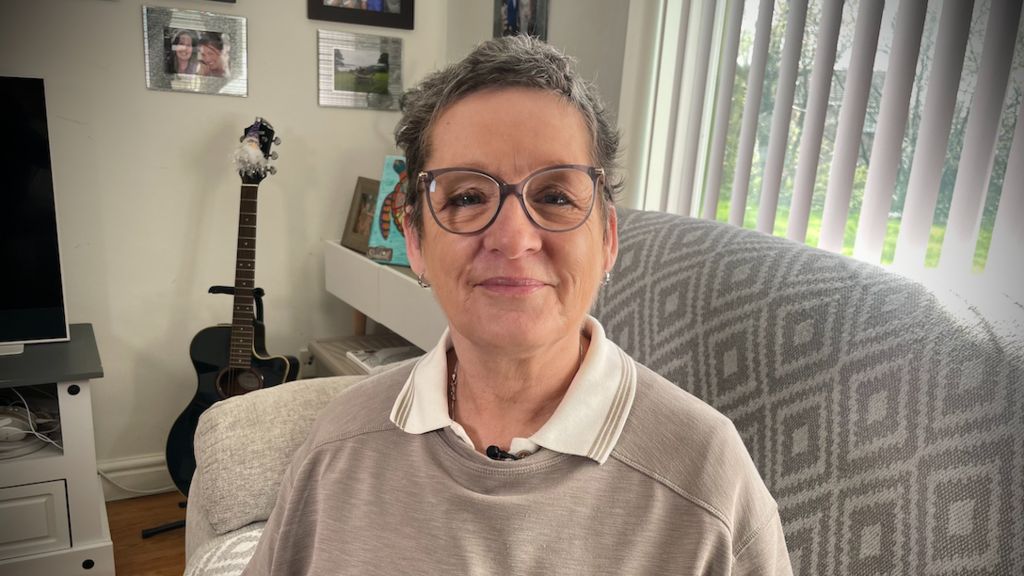Cancer survivor's flat fees double in a year

Mandy Francis, 64, says she feels embarrassed to have friends over
- Published
A cancer survivor is among people whose flat fees have nearly doubled to more than £2,500 in the space of a year.
Mandy Francis, 64, said it was "stressful" after her maintenance fee for her flat in Llwynhendy, Carmarthenshire, rose from £1,360 a year to £2,647.
She said people living there were treated as account numbers rather than human beings.
Principle Estate Management, which runs the building, did not respond to requests for comment.
- Published27 November 2023
- Published26 February
- Published4 March 2023
Maintenance fees pay for the general upkeep of communal and outside areas of the flats, but people living there said they were "disgusting".
In 2019, the fees were £1,080 a year, and in 2023 they were £1,360. In 2024, they increased to £2,647 a year.
Ms Francis moved into her flat in 2019 and was initially happy, but shortly afterwards the fees rose and despite the increase, the state of the building deteriorated.
"The gardens are a mess, they haven’t cut the grass for six months, the communal areas aren’t good, and the intercom doesn’t work."
Mandy Francis was recovering from cancer when the maintenance fees on her flat nearly doubled
According to the UK government, most flats in the UK are leasehold, meaning that although residents own their flat for a period of time, they do not have any ownership of the building.
Leaseholders pay the freeholder - the owner of the building - via a managing agent for the upkeep of communal and outside areas, including painting the building and cleaning.
People have complained many times to the company managing the flat
Ms Francis was undergoing cancer treatment last year and was off work.
She said Principle Estate Management requested an additional one-off payment of £375 from each resident for maintenance.
She was unable to pay this and claimed she was forced to borrow money from a family member after she was threatened with legal action.
"I couldn’t sleep, it was making my recovery from cancer harder because I was stressing about money all the time.
"They don’t treat us as human beings, they treat us as account numbers."
Mandy says she felt unsafe taking her bins out
She said that she felt unsafe taking her bins out while undergoing treatment as she was prone to picking up infections and they were "full of slugs and flies".
She was so nervous about it, she asked her sons to take her bins out for her.
Birmingham-based Principle Estate Agent rarely visit the flats, she added.
“They don’t know our situation here, we’re not on London wages, I would say most residents like myself are on minimum wage”.
What to do in this situation
The Leasehold Advisory Service, external offers the following advice:
Work together to form a leaseholder resident's group (known as a recognised tenants association under the 1985 Landlord and Tenant Act)
Consider taking over the management of the property under the 2002 Commonhold and Leasehold Reform Act
Keep a record of letters written to the management directors or landlord
Pay service charges first and then dispute
The Leasehold Reform Bill is going through Parliament, and is being debated in the House of Lords.
The UK government said the it would improve home ownership for millions across England and Wales by improving transparency of service charges and delivering 990-year lease extensions.
The bill would also mean banning any new leasehold houses but not flats.
Nia Griffiths, MP for Llanelli, said the bill was a step in the right direction, but worries that it does not give the full transparency needed.
"It doesn’t help people who live in flats and could be a lot stronger as a bill," she added.
Nia Griffith MP is calling for leasehold flats to be banned
Wallace Estates, which is partly responsible for running the flats, said installing a new fire alarm system, combined with high inflation, caused the maintenance fees increase.
A spokesman added: "We sympathise with the leaseholders and are working with Principle Estate Management to spread the costs to help leaseholders at a time when households finances are already stretched."
The Welsh government said it would continue to review and consider whether any further changes were required following the implementation of the significant improvements in the bill.
The UK government called unjustified increases in service charges "completely unacceptable" and said it expected landlords to engage with leaseholders over the need and justification of major works.